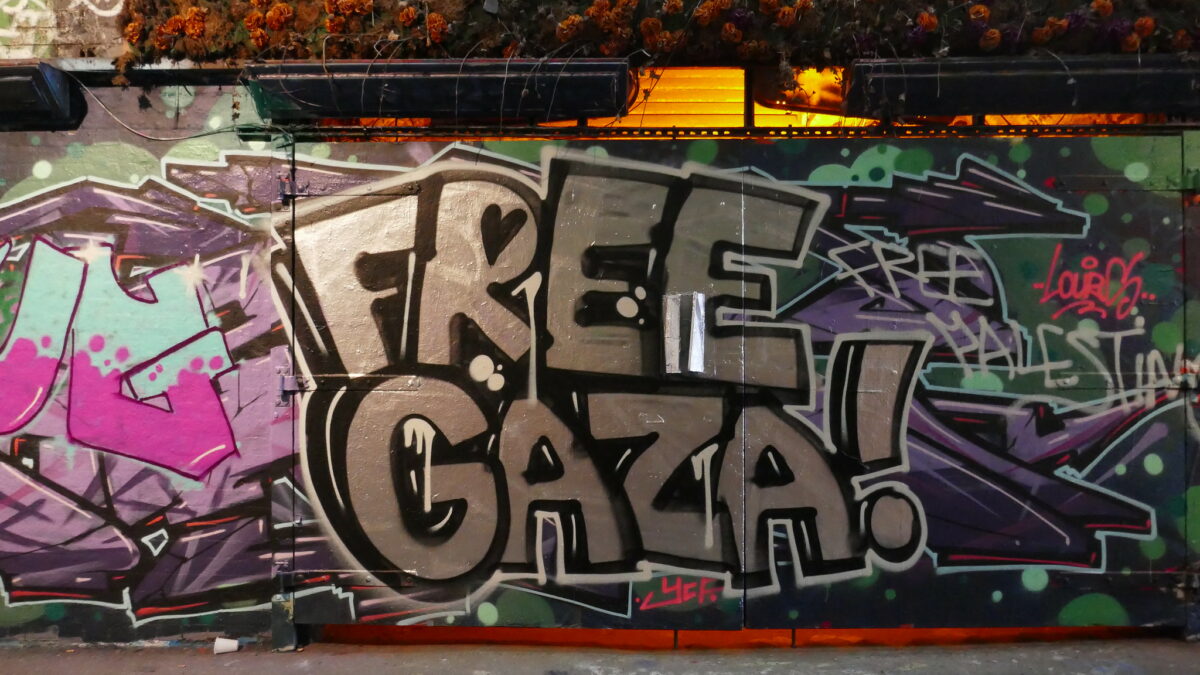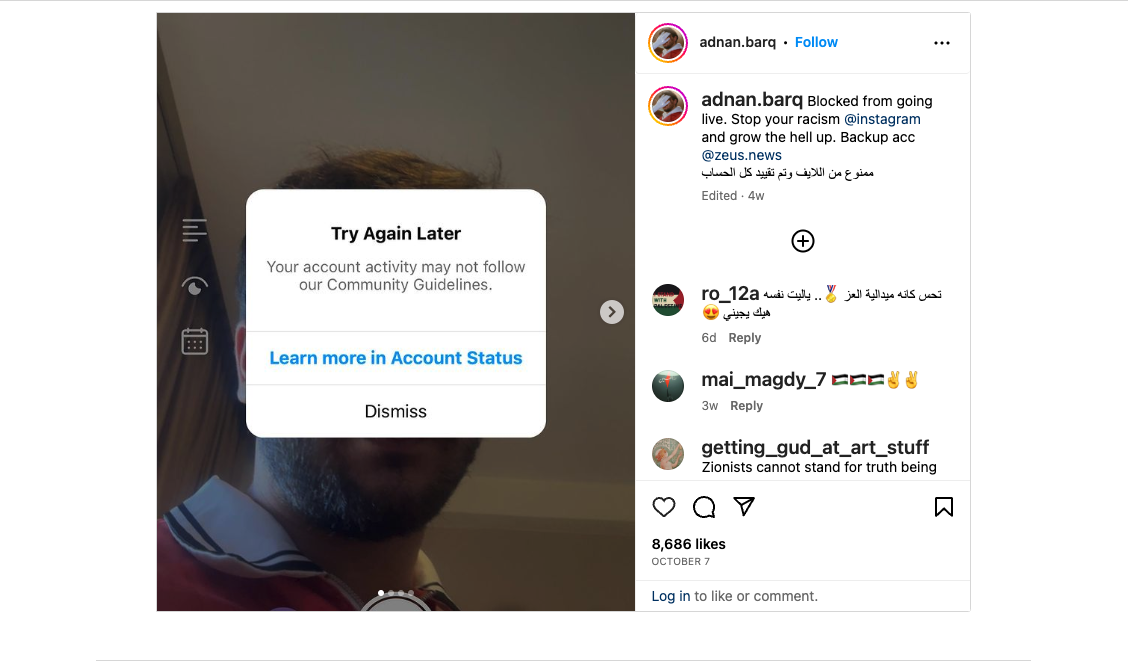
Photo by Duncan Cumming on Flickr. CC BY-NC 2.0.
Since the start of Operation Al-Aqsa Flood in October 2023, social media giants have actively suppressed pro-Palestinian narratives. They utilized several tactics, including suspending journalists’ and key media outlets’ accounts without prior notice or clear explanation.
On October 13, tech giant Meta, owner of Facebook, Instagram, and WhatsApp, announced actions aimed at removing “praise and substantive support” of Palestinian Resistance Movement (Hamas), the political and military organization that governs Gaza.
Similarly, X (formerly Twitter) deleted several accounts it claimed were “Hamas-affiliated” to curb “violent and hateful” online content.
TikTok also announced the removal of 24 million global accounts since October 7, for violating their policies on violence, hate speech, misinformation, and terrorism.
On November 2, Israeli officials confirmed that Facebook, Instagram, and TikTok have responded to 92 percent of their requests to remove content about Palestine.
Yet, numerous social media users on Facebook and Instagram reported censorship of their pro-Palestine content, even if it doesn’t support Hamas.
We just had a video removed immediately upon publication on @instagram. The platform claimed it contained “praise or support” of “people and organizations we define as dangerous.” The video did nothing of the sort.
It was a video report – from our journalists – about increased… pic.twitter.com/F7FBWalrz1
— Mondoweiss (@Mondoweiss) October 28, 2023
One such instance involves Motaz Azaiza, a Palestinian photojournalist, has been documenting real-time images and videos of the Israeli carpet bombing from the frontlines in Gaza since October 7.
Meta suspended his account after he posted a video on October 12 depicting the aftermath of an Israeli bombardment in his neighborhood — the Deir al-Balah refugee camp, which tragically killed at least 15 of his family members, predominantly women and children.
In the video, Azaiza initially directed the camera towards himself, visibly distressed, before revealing a harrowing scene: a demolished building, a bloodstain, and a neighbor holding the lifeless body of a child.
Following user backlash, Instagram reinstated Azaiza's account one day later.
Eye on Palestine, an Instagram account boasting over 7 million followers, reports daily on Israel’s abuses in the occupied West Bank and Gaza. Despite its crucial role in reporting Israel's aggression in Gaza, the account faced stringent censorship, impairing its ability to cover war crimes, human rights violations, and the destruction, intense bombardment and targeting of Gaza's civilians.
Posts from Eye on Palestine are widely circulated and reposted by thousands on Instagram, highlighting the extensive impact of censorship. In a statement, the account's owner explained that the page was temporarily closed due to both ongoing reports and technical issues. Meta initially cited ‘security concerns related to a possible hacking attempt‘ but later reinstated the account following communication with the owners, and a backlash from activists.
Blaming glitches to conceal biased moderation and policy over-enforcement
Over the three weeks since the war began, there's been a surge in shadow-banning, a form of censorship restricting the visibility of Palestinian-supporting content without notifying users.
After posting an Instagram story about the war in Gaza yesterday, my account was shadowbanned. Many colleagues and journalists friends have reported the same. It’s an extraordinary threat to the flow of information and credible journalism about an unprecedented war…
— Azmat Khan (@AzmatZahra) October 15, 2023
Instagram users reported a significant drop in views and likes on pro-Palestinian posts and stories.

Screenshot of a post by yallaletstalk. Fair use.
Some users face challenges hosting live videos. Posts containing hashtags like “FreePalestine” and “IStandWithPalestine” are often hidden or removed, under the pretext of violating the platform's content policies.

Screenshot of a post by adnan.barq. Fair use.
To add insult to injury, Instagram recently added the term “terrorist” to the bios of several Palestinian users. This action sparked concerns about discriminatory and algorithmic bias against Palestinians and Arabic content.
Users with multilingual profiles, featuring ‘Palestinian’ in English, a Palestinian flag emoji, or the Arabic term ‘alhamdulillah’ (meaning ‘Praise to God’), reported an issue. Clicking ‘see translations’ rendered ‘alhamdulillah’ along the Palestinian flag as ‘praise to God, Palestinian terrorists are fighting for their freedom,’ causing confusion.
Meta, once again, attributed the problem to a “glitch” and claimed to have resolved it.
A Guardian report on November 3 uncovered a persistent bias within the platform’s AI algorithms. WhatsApp image generation, a feature that uses AI prompts to convert user thoughts into personalized, animated stickers, featured a gun or a boy holding a gun upon entering the term “Palestine” or “Palestinians.” In contrast, “Israeli boy” generated friendly cartoons, and “Israeli army” depicted gun-free soldiers.
Continuously dismissing these incidents as glitches in pro-Palestine content no longer convinces social media users and digital rights advocates, given the platform's track record in silencing Palestinian voices. This was evident during systematic censorship of Palestinian accounts on Instagram during the Sheikh Jarrah protests in 2021, and the Israeli army's deadly raids on Jenin in the West Bank in 2023.
28 journalists killed in G-Zambia. Two journalists had their families killed.
No other reporters can enter.
They’re trying to hide the crimes and I can’t even write “g-z-“ because cyber-censorship.
Madness.
— Mariam Barghouti مريم البرغوثي (@MariamBarghouti) October 26, 2023
Alarmingly, Meta overlooked hate speech and incitement to violence targeting Palestinians.
In this context, Amnesty International reported substantial posts glorifying Israel's attacks on Gaza, supporting its destruction, and advocating violence against Palestinians. These posts often used dehumanizing and racist language echoing Israeli authorities’ rhetoric.
Moreover, since October 7, Palestinian digital rights organization The Arab Centre for Advancement of Social Media (7amleh) has documented 699,958 cases of hate speech and inciting content in Hebrew. At least 30 percent of the hate content included fake news, promoting violence or incitement. Unfortunately, Meta dismissed these reports. This highlights the double standards in how social media platforms enforce their policies on Arabic vs Hebrew content in times of war.
Meta's Dangerous Organizations and Individuals policy maintains a secret blacklist primarily targeting Muslim, Middle Eastern, and South Asian entities. This contributes significantly excessive enforcement against Palestinians and content in Arabic.
Tech giants’ role in Gaza's isolation amid total blackout
Amid the relentless bombardment of Gaza, Palestinians face a deepening communication blackout, stifling access to vital information. Simultaneously, a humanitarian crisis escalates as Israel cuts off water, electricity, fuel, medical supplies, and food, exacerbating the dire situation in Gaza.
No news from Gaza doesn't mean the bombing stopped. Israel cut off internet and all telecommunication services 9 hours ago. People in Gaza are still being bombed from land, air, and sea while they're cut off from the world!
— #CeasefireNow فِداء (@fidaazaanin) November 1, 2023
For 36 hours starting on October 27, telecommunication networks, including fixed, cellular, and internet services, were down, isolating 2.3 million Palestinians and essential emergency services. The International Telecommunication Union, the UN's internet governance body, condemned the communication blackout in Gaza, urging the restoration of network access. To date, Gaza has experienced three total telecommunication blackouts since October 7.
Transcript:
“All connections are down here in the Gaza Strip; no networks are available. Those who are lucky who have foreigner sim cards can actually have some internet for like just few minutes. Situation is deteriorating; we don’t know what’s coming next.
(1/3) https://t.co/GMeLCcykw1— Al-Ghader/River (@JustA_RandomFan) October 28, 2023
The internet is completely down in #Gaza once again. We can't communicate or check on our loved ones. Even emergency services and civil defense are unreachable. We only see missile flashes and hear the sound of shells, and we don't know what's happening. pic.twitter.com/IGnKn0hsVm
— Ahmed From #Gaza (@madhoun95) November 1, 2023
Social media platforms’ disproportionate, biased, and restrictive content moderation deliberately silences Palestinians, restricting their ability to freely express themselves, document violations, and connect within and outside Gaza. This worsens the situation in Gaza, contrasting with the platforms’ claimed role of connecting people, particularly during times of war.
Ignoring these concerns risks platforms’ complicity in grave human rights violations and breaches of international law, including war crimes — leading to an unparalleled toll on civilian lives and a dire humanitarian crisis in Gaza.
There are concerning reports that content posted by Palestinians and advocates of Palestinian rights are being subject to potentially discriminatory content moderation by social media platforms. pic.twitter.com/iZgEVNCXpR
— Amnesty International (@amnesty) October 31, 2023



